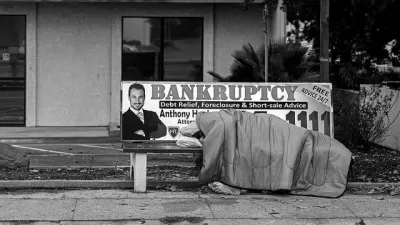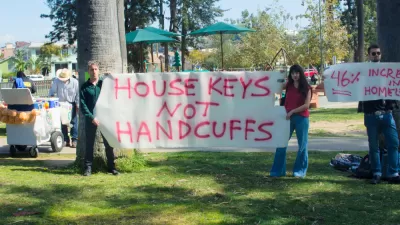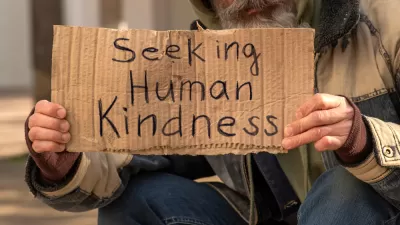Two articles raise questions about the state of humanity, as evidenced by the way news organizations and politicians write and talk about the homeless.

Sahra Sulaiman writes from Los Angeles, providing a survey of recent news coverage that "punches down" on the homeless population in the city, from the Los Angeles Times and the local NBC affiliate, and along the way points out the numerous other framing devices and words media outlets can choose to use when covering homelessness.
A separate article by Tim Mercer crafts a similar argument for Austin, except the focus of this criticism is the politicians that do the state's work in that city. Mercer, a professor and a doctor who treats the homeless in Austin, writes:
My heart is heavy. ”‘Vagrants’, ‘derelicts’, ‘filth’, and ‘vermin’” is what some Austinites are calling individuals experiencing homelessness, according to the Statesman’s analysis of communications sent to Gov. Greg Abbott in support of his recent actions to address homelessness. These human beings who are referred to as “vermin” are my patients. I and others who work in this field choose our words very carefully when we say “individuals experiencing homelessness.” Because “homeless” does not define them and is not their identity. It certainly does not reduce them to dirt or insects.
FULL STORY: Homelessness Coverage that Punches Down: Could We Just Not?

Planetizen Federal Action Tracker
A weekly monitor of how Trump’s orders and actions are impacting planners and planning in America.

Restaurant Patios Were a Pandemic Win — Why Were They so Hard to Keep?
Social distancing requirements and changes in travel patterns prompted cities to pilot new uses for street and sidewalk space. Then it got complicated.

Maui's Vacation Rental Debate Turns Ugly
Verbal attacks, misinformation campaigns and fistfights plague a high-stakes debate to convert thousands of vacation rentals into long-term housing.

In California Battle of Housing vs. Environment, Housing Just Won
A new state law significantly limits the power of CEQA, an environmental review law that served as a powerful tool for blocking new development.

Boulder Eliminates Parking Minimums Citywide
Officials estimate the cost of building a single underground parking space at up to $100,000.

Orange County, Florida Adopts Largest US “Sprawl Repair” Code
The ‘Orange Code’ seeks to rectify decades of sprawl-inducing, car-oriented development.
Urban Design for Planners 1: Software Tools
This six-course series explores essential urban design concepts using open source software and equips planners with the tools they need to participate fully in the urban design process.
Planning for Universal Design
Learn the tools for implementing Universal Design in planning regulations.
Heyer Gruel & Associates PA
JM Goldson LLC
Custer County Colorado
City of Camden Redevelopment Agency
City of Astoria
Transportation Research & Education Center (TREC) at Portland State University
Jefferson Parish Government
Camden Redevelopment Agency
City of Claremont





























